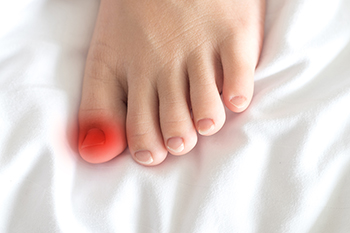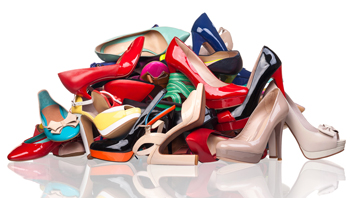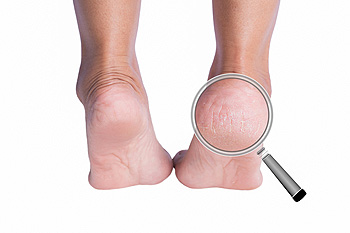Connect With Us
Blog
Items filtered by date: July 2022
Why Live with Pain and Numbness in Your Feet?
Compression Socks and a Cold Foot Soak

There are many people who have jobs that require standing and working on their feet. Foot pain is a common ailment among people who are in this category and it can be reduced or diminished when the proper footwear is worn. It is beneficial to wear a shoe with a small heel and weakness and soreness can be reduced when work shoes have proper arch support. It is important that shoes fit correctly as this may prevent poor circulation and blisters from developing. Some people choose to wear compression socks, which can be helpful in reducing blood flow to the feet, and redirecting it toward the heart. When the workday is finished, the feet will feel better when they are soaked in cold water followed by massaging them. This is beneficial in reducing inflammation and swelling that can happen during the work day. If you would like additional information about how your feet can feel better at the end of the day, please speak with a podiatrist who can offer you effective foot care tips.
While working on the feet, it is important to take the proper care of them. For more information about working on your feet, contact Dr. Harry I. Zirna from Lockport Foot Care, PLLC. Dr. Zirna will treat your foot and ankle needs.
Working on Your Feet
Standing on your feet for long periods of time can cause stress and pain in your feet. Your whole body may experience change in terms of posture, back pain, bunions, callouses and or plantar warts. There are ways to avoid these conditions with proper foot care, smart choices and correct posture.
Positive Changes
Negative heeled shoe – Choosing this shoe type places the heel slightly lower than the ball of the foot. These are great for overall foot health. Find shoes that fit you correctly.
Go barefoot – Our feet were not designed to be enclosed for all hours of the day. Try to periodically expose your feet to air.
Eliminate Pain
Foot Exercises – Performing simple exercises, incorporating yoga and doing stretches are beneficial. This will allow increased blood flow to the area and muscles of the foot.
Achilles tendon – Stretching the foot out flat on the floor will relax the calf muscles and tendon. These exercises can be performed almost anywhere. Make sure you add these exercises to your daily regimen.
With a little bit of this information and knowing more about foot health, you will notice changes. Foot stretches and proper footwear will help with pain and prevent further issues.
If you have any questions please feel free to contact our offices located in Lockport, NY . We offer the newest diagnostic and treatment technologies for all your foot and ankle needs.
Probable Causes for an Ingrown Toenail

An ingrown toenail is a common foot condition. It occurs as a result of the skin growing into the sides of the nail instead of over it. The symptoms that are generally associated with this ailment often include extreme tenderness, swelling, and is often painful. The big toe is typically affected by an ingrown toenail, although it can affect the other toes. In severe cases, the affected toe may produce a discharge, and can become infected. Ingrown toenails can happen for a variety of reasons. These can include wearing shoes that do not fit correctly, incurring a toe injury, or possibly from genetic reasons. Additionally, it may come from trimming the toenails incorrectly. Relief can come from soaking the toe in warm water, followed by gently pulling the skin away from the nail. If the ingrown toenail is severe, surgery may have to be performed that can remove part of the nail, or the entire nail. It is important to wear shoes that are comfortable, and fit correctly, and it is beneficial to refrain from wearing tight socks. If you are afflicted with an ingrown toenail, please consult with a podiatrist as quickly as possible who can recommend the right treatment for you.
Ingrown toenails can become painful if they are not treated properly. For more information about ingrown toenails, contact Dr. Harry I. Zirna of Lockport Foot Care, PLLC. Dr. Zirna can provide the care you need to keep you pain-free and on your feet.
Ingrown Toenails
Ingrown toenails occur when a toenail grows sideways into the bed of the nail, causing pain, swelling, and possibly infection.
Causes
- Bacterial infections
- Improper nail cutting such as cutting it too short or not straight across
- Trauma to the toe, such as stubbing, which causes the nail to grow back irregularly
- Ill-fitting shoes that bunch the toes too close together
- Genetic predisposition
Prevention
Because ingrown toenails are not something found outside of shoe-wearing cultures, going barefoot as often as possible will decrease the likeliness of developing ingrown toenails. Wearing proper fitting shoes and using proper cutting techniques will also help decrease your risk of developing ingrown toenails.
Treatment
Ingrown toenails are a very treatable foot condition. In minor cases, soaking the affected area in salt or antibacterial soaps will not only help with the ingrown nail itself, but also help prevent any infections from occurring. In more severe cases, surgery is an option. In either case, speaking to your podiatrist about this condition will help you get a better understanding of specific treatment options that are right for you.
If you have any questions please feel free to contact our offices located in Lockport, NY . We offer the newest diagnostic and treatment technologies for all your foot and ankle needs.
Mitigating the Effects of High Heels

Before leaving for a night out or preparing for a fancy event, many women will choose to complete their outfit by wearing a fashionable pair of high heels. Although such footwear is undoubtedly chic and visually striking, it can also cause serious and lasting damage to your feet. For example, when wearing a pair of high heels, one’s Achilles tendon tightens and shrinks, which can be painful and strain the lower leg muscles. In the long term, wearing these shoes for an extended period of time can even contribute to plantar fasciitis, a troublesome foot ailment. Although high heels can certainly pose a serious threat to the health of your feet, there are steps you can take to mitigate the detrimental effects of high heels. First, if you must wear high heels for an event, try to reduce the amount of time that you wear them. You might try waiting to put on your shoes until just before leaving and taking them off after approximately four hours at most. Second, if you must wear high heels, try to select a pair that offers a lower heel (i.e. an inch and a half). You might also try to find heels that are wider or chunkier, as these kinds of heels are more stable and won’t place too much pressure on your feet. Selecting the right kind of high heels and wearing them properly are a critical component of the health of your feet. For more information about high heels, contact a podiatrist.
High heels have a history of causing foot and ankle problems. If you have any concerns about your feet or ankles, contact Dr. Harry I. Zirna from Lockport Foot Care, PLLC. Dr. Zirna can provide the care you need to keep you pain-free and on your feet.
Effects of High Heels on the Feet
High heels are popular shoes among women because of their many styles and societal appeal. Despite this, high heels can still cause many health problems if worn too frequently.
Which Parts of My Body Will Be Affected by High Heels?
- Ankle Joints
- Achilles Tendon – May shorten and stiffen with prolonged wear
- Balls of the Feet
- Knees – Heels cause the knees to bend constantly, creating stress on them
- Back – They decrease the spine’s ability to absorb shock, which may lead to back pain. The vertebrae of the lower back may compress.
What Kinds of Foot Problems Can Develop from Wearing High Heels?
- Corns
- Calluses
- Hammertoe
- Bunions
- Morton’s Neuroma
- Plantar Fasciitis
How Can I Still Wear High Heels and Maintain Foot Health?
If you want to wear high heeled shoes, make sure that you are not wearing them every day, as this will help prevent long term physical problems. Try wearing thicker heels as opposed to stilettos to distribute weight more evenly across the feet. Always make sure you are wearing the proper shoes for the right occasion, such as sneakers for exercising. If you walk to work, try carrying your heels with you and changing into them once you arrive at work. Adding inserts to your heels can help cushion your feet and absorb shock. Full foot inserts or metatarsal pads are available.
If you have any questions please feel free to contact our offices located in Lockport, NY . We offer the newest diagnostic and treatment technologies for all your foot and ankle needs.
Tips to Remedy Cracked Heels

Approximately 20% of all adults in the United States will experience heel fissures, or “cracked heels,” at least once during their lifetime. Cracked heels typically occur when the skin surrounding one’s heel becomes noticeably tough, dry, and thick. The dried skin around the heel can eventually crack, creating fissures. The risk of developing cracked heels is markedly higher during the winter season when the colder weather typically makes the skin drier. If you are experiencing cracked heels, you may be able to make use of several at-home remedies. For example, you may soak your feet in water for approximately 20 minutes and use a pumice stone to gently remove the hardened skin cells. Afterwards, you may apply a heavy-duty moisturizer to the back of your heel. Typically, moisturizers containing ingredients such as petroleum jelly or glycerin can effectively nourish the skin. To address cracked heels, you might also use alpha-hydroxy acids or urea to target hardened skin cells and effectively remove them from your heels. If at-home remedies like these fail to mitigate cracked heels, this could be a sign to consult a podiatrist. Ultimately, cracked heels can be an unsightly annoyance, but you and your podiatrist can take steps to address the affliction.
If the skin on your feet starts to crack, you may want to see a podiatrist to find treatment. If you have any concerns, contact Dr. Harry I. Zirna from Lockport Foot Care, PLLC. Dr. Zirna can provide the care you need to keep you pain-free and on your feet.
Cracked Heels
It is important to moisturize your cracked heels in order to prevent pain, bleeding, and infection. The reason cracked heels form is because the skin on the foot is too dry to support the immense pressure placed on them. When the foot expands, the dry skin on the foot begins to split.
Ways to Help Heal Them
- Invest in a good foot cream
- Try Using Petroleum Jelly
- Ease up on Soaps
- Drink Plenty of Water
Ways to Prevent Cracked Heels
- Moisturize After Showering
- Skip a Shower
- Keep Shower Water Lukewarm
- Don’t Scrub Your Feet
If you are unsure how to proceed in treating cracked heels, seek guidance from a podiatrist. Your doctor will help you with any questions or information you may need.
If you have any questions, please feel free to contact our offices located in Lockport, NY . We offer the newest diagnostic and treatment technologies for all your foot care needs.
Blog Archives
- March 2024
- February 2024
- January 2024
- December 2023
- November 2023
- October 2023
- September 2023
- August 2023
- July 2023
- June 2023
- May 2023
- April 2023
- March 2023
- February 2023
- January 2023
- December 2022
- November 2022
- October 2022
- September 2022
- August 2022
- July 2022
- June 2022
- May 2022
- April 2022
- March 2022
- February 2022
- January 2022
- December 2021
- November 2021
- October 2021
- September 2021
- August 2021
- July 2021
- June 2021
- May 2021
- April 2021
- March 2021
- February 2021
- January 2021
- December 2020
- November 2020
- October 2020
- September 2020
- August 2020
- July 2020
- June 2020
- May 2020
- April 2020
- March 2020
- February 2020
- January 2020
- December 2019
- November 2019
- October 2019
- September 2019
- August 2019
- July 2019
- June 2019
- May 2019
- April 2019
- March 2019
- February 2019
- January 2019
- December 2018
- November 2018
- October 2018
- September 2018
- August 2018
- July 2018
- June 2018
- May 2018
- April 2018
- March 2018
- February 2018
- January 2018
- December 2017
- November 2017
- October 2017
- September 2017
- August 2017
- July 2017
- June 2017
- May 2017
- April 2017
- March 2017
- February 2017
- January 2017
- December 2016
- November 2016
- October 2016
- September 2016
- August 2016
- July 2016
- June 2016
- May 2016
- April 2016

